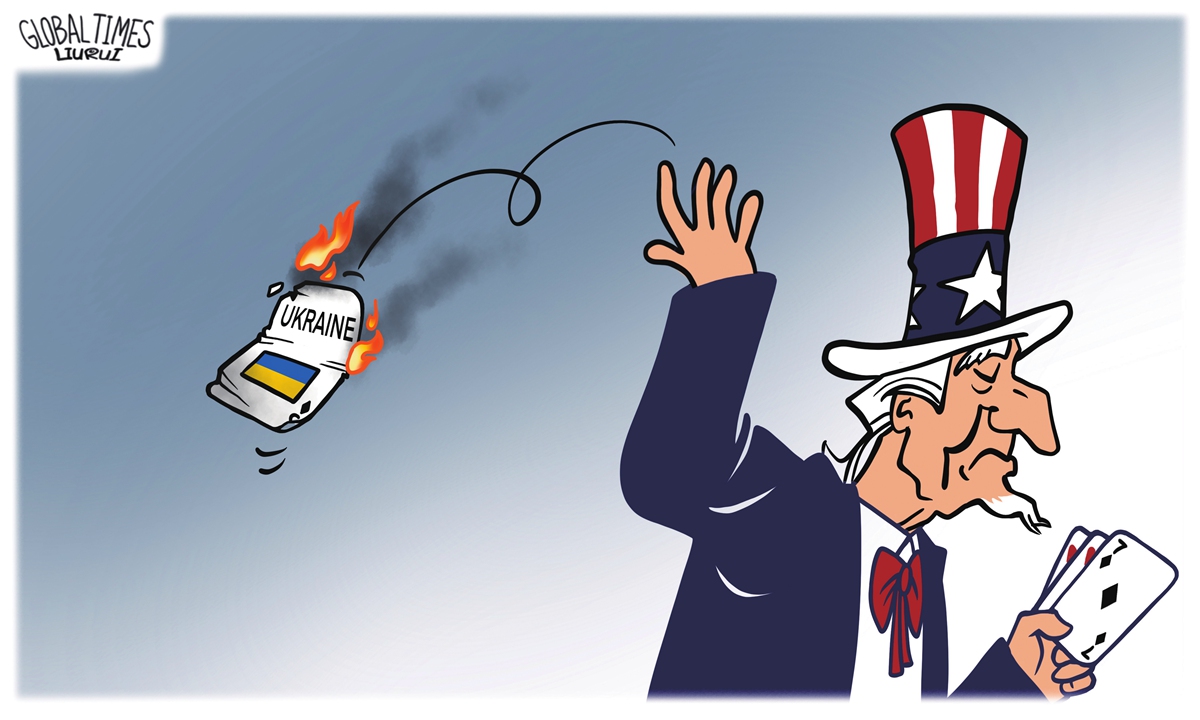
Illustration: Liu Rui/GT
Perhaps no country in the world yearns for a change in its declining image more than the US. Thus, Kurt Campbell, White House Indo-Pacific policy coordinator, put forward his opinion on Monday: The US can focus on two theaters - the Indo-Pacific and the war in Europe. He wants to prove that the US is still dominant and its might remains unrivaled.
The hard truth is Washington is reluctant to step into even one theater of war.
During an event hosted by German Marshall Fund, a US think tank, Campbell said that Washington had been deeply engaged in two theaters simultaneously before, including during WWII and the Cold War. "It's difficult. It's expensive. But it is also essential," he emphasized.
Campbell's following remarks soon exposed his attempt to mislead the audience. He named a few events to show the US "determination" to sustain high-level engagement with the Indo-Pacific region, including a scheduled summit with Southeast Asian leaders in March and a planned summit of the Quad grouping of the US, Australia, Japan and India in May.
He was just playing with words. By deliberately mentioning the word "theater," Campbell equated dealing with two US political rivals at the same time with fighting in two wars against two US adversaries simultaneously, Shen Yi, a professor at the School of International Relations and Public Affairs of Fudan University, told the Global Times.
Even if people focus only on the US' capabilities during the WWII and the Cold War, history tells another story, one that is different from the one Campbell has tried hard to present.
During the WWII, the US did fight in the Pacific Ocean theater and the European theater. Yet, at the 1941 Arcadia Conference between then US president Franklin D. Roosevelt and British prime minister Winston Churchill shortly after the US entered the war, the "Europe First" strategy was affirmed. That meant the US and the UK would devote more of their resources to fight in the European theater first.
When it came to the Cold War, reports show that observers used to say that the Pentagon was prepared to fight two and a half wars at the same time, which implied the US should have the capability of fighting two large regional wars and a small one simultaneously.
Really? Then what led to the historic ice-breaking of China-US ties and the establishment of diplomatic relations between the two countries?
"Former president Richard Nixon had long ago done the math for the US - it could not afford to fight two wars at once. That's why Washington decided to ease tensions with one side, which eventually led to his visit to China," Shen said.
As for the US strength today, setting aside the fact the country is far from its glory days, Washington is not confident it can win even one regional war. The US' announcement of not sending its military forces to the frontlines in Ukraine is proof. More examples can be listed - being mired in conflicts in Vietnam, Afghanistan… and failing to claim victory in either. Against this backdrop, fighting two wars will only be a suicide mission for the US.
The US has right now a disastrous domestic economy to cope with. When it plucked up the courage to unleash nuclear-level sanctions - kicking Russia out of the SWIFT system, it had to carefully skirt around the Russian banks involved in the energy sector. "How can Campbell convince anyone that the US can still fight and win two wars with such an overcautious and faint-hearted approach?" Shen questioned.
But the US is afraid to show its weakness to the world, which is what prompted Campbell to have tried so hard to purposefully misguide his audience, giving the false impression that the US is still powerful. The tougher American politicians play, the more they reveal how frail the US has become.
The island of Taiwan is shivering after having witnessed what's going on in Ukraine. Campbell may try to boost the island's morale by attempting to talk tough toward the Chinese mainland, pretending it can prevent China's reunification, said Xu Liang, associate professor at the School of International Relations, Beijing International Studies University.
Campbell might want to assure the island of Taiwan that the US can still offer impenetrable defense for the island, although it has been only watching the Ukraine crisis from the other side of the globe. It remains to be seen how many forces still buy US' assurances.
Compared with the WWII era, the sun is setting on the US, which is now trying to boost its influence by talking big and launching wars of words. Who is it trying to fool? Who can it intimidate? Forget about two wars, even one theater of war would be too much for the US.




